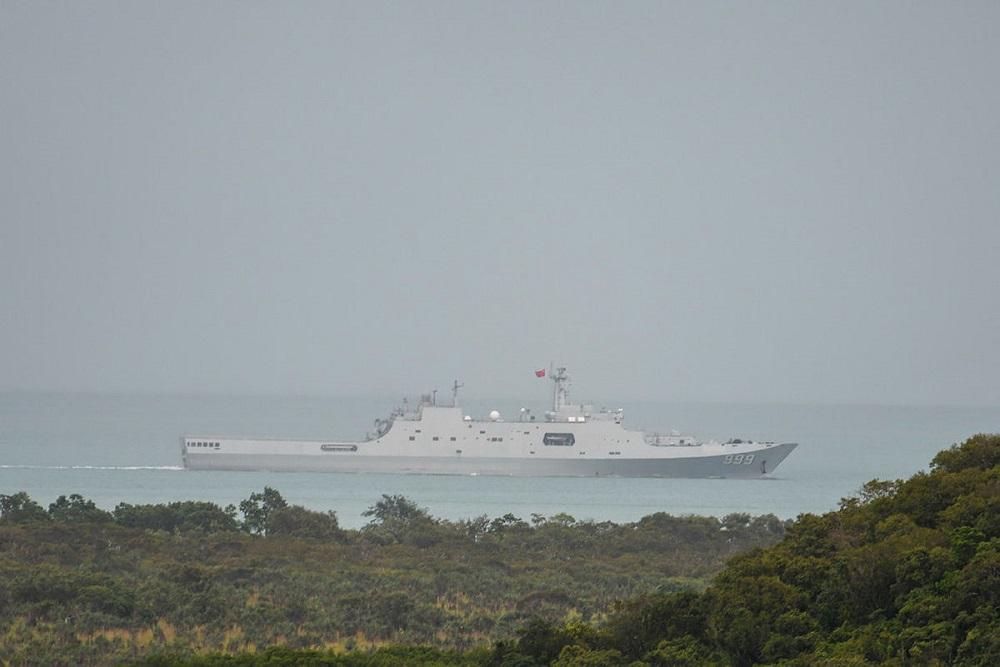We mustn’t be afraid to mention China in public discussions about defence
Posted By Alex Bristow on February 16, 2024 @ 06:00

Writing in The Australian Financial Review on 5 February, my former ASPI colleague, Jennifer Parker, put forward [1] an excellent argument for granting more leeway to serving Defence personnel to speak out on defence affairs, raising public understanding of threats, and building the social licence for increased defence spending. However, one essential word was missing from Jen’s argument: ‘China’.
China is the state that poses the greatest danger to Australia and the stability of our region. We will not generate or sustain public consent for necessary rises in defence spending and the whole-of-nation effort required in the years ahead until our national security establishment stops treating China as a taboo subject in public.
To be fair, our women and men in uniform and our defence and national security officials do not have their heads in the sand about Xi Jinping’s China. ADF personnel literally risk their lives to confront the day-to-day reality of Chinese coercion and brinkmanship, as shown by the PLA’s dangerous use of sonar against divers from HMAS Toowoomba and its release of chaff [2] into the path of an RAAF surveillance aircraft.
The public must tap the military’s experience to build our understanding of Chinese sharp power, especially as it seems grimly inevitable that Beijing’s recklessness will lead to a deadly incident sooner or later, plunging us into a crisis for which the nation is sorely unprepared.
That crisis will include a dramatically ramped-up, CCP-directed political warfare campaign to divide our communities by falsely claiming that criticism of Beijing is a racist slur against the Chinese people, including Chinese Australians. Indeed, I expect to be labelled [3] a hawk, or worse, for daring to utter concerns about China in this piece. But self-censoring for fear of upsetting Beijing is not a deterrence or preparation strategy. Inoculating ourselves against such disinformation, including through the provision of information, is a whole-of-nation endeavour in which Defence must play a vital role.
While senior defence staff should become more visible and vocal in our public debate, Defence must also engage at the grass roots, with our veterans, reservists and regulars at all ranks given opportunities for community engagement. This is even more important as the Commonwealth and state governments work to backfill [4] the military’s role in domestic disaster relief. This is necessary to preserve the ADF for its primary duties of deterrence and preparedness for war, but the trust and compact between the military and the nation must not be inadvertent casualties of these changes.
A good starting place for Defence to be candid about the threat posed by China is the forthcoming national defence strategy (NDS). The published version of the defence strategic review [5] (DSR) that laid the groundwork for the NDS made shrewd observations about China’s growing military capabilities and coercive playbook. But it followed the tendency in our public debate to use abstractions like our deteriorating strategic circumstances. Such abstractions cloud public understanding of the fact it is Beijing’s actions that are threatening our security and destabilising our region, not amorphous concepts like great power rivalry.
Greater candour about China also needs to extend into closed-door discussions within government. For instance, the classified version of the DSR was probably restricted to senior echelons of need-to-know ministries because it was clear-eyed on China. And while it was encouraging to hear Deputy Prime Minister and Defence Minister Richard Marles tell the ASPI conference [6] last year that the DSR includes the most comprehensive review of mobilisation since World War II, it’s telling that none of this was deemed suitable for public consumption. This is not a sound foundation for a genuinely national approach to defence.
Being candid about China is not alarmist. Government openness about the threat posed by Soviet communism underpinned public consent for substantially higher levels of defence spending as a percentage of national income during the cold war, including during Bob Hawke’s Labor government in the 1980s when Defence estimated [7] that we would have a 10-year warning against non-nuclear attack. Our officials, ministers and allies tell us that we now face greater danger, and that attack could come without warning. Yet the government dons kid-gloves when it comes to publicly acknowledging that China is the primary threat.
Plain language on China would also help apportion the scarce resources of Defence and other parts of the national security ecosystem across a range of threats. The DSR calls for an ADF focused on ‘the nation’s most significant military risks’, but without clarity about which capabilities are required to counter China, there is a risk that the ADF will lose the scale and flexibility to fulfil other essential roles, as shown [8] recently when ships were not available for collective maritime security operations in the Red Sea.
The main impediment to the government being more open about China is China. Labor’s stabilisation of the bilateral relationship is already being sorely tested [9], as Australian academic Yang Hengjun’s death sentence reminded us. Beijing would doubtless apply further pressure if the Australian government, including Defence, were honest with the Australian public about the scale and urgency of the threat China poses. But Beijing has shown that it will pressure us regardless so leaving the nation unprepared is unacceptable.
Australia does not seek an adversarial relationship with China, but Xi Jinping must learn to accept that democracies, unlike the CCP, have a duty to tell their public the truth.
Article printed from The Strategist: https://aspistrategist.ru
URL to article: /we-mustnt-be-afraid-to-mention-china-in-public-discussions-about-defence/
URLs in this post:
[1] put forward: https://www.afr.com/policy/foreign-affairs/why-is-defence-so-little-involved-in-the-great-defence-debate-20240201-p5f1jq
[2] release of chaff: https://www.minister.defence.gov.au/transcripts/2022-06-06/doorstop-interview-geelong
[3] labelled: http://sydney.china-consulate.gov.cn/eng/zlgdt/202208/t20220825_10752824.htm
[4] backfill: /the-adf-will-have-to-deal-with-the-consequences-of-climate-change/
[5] defence strategic review: https://www.defence.gov.au/about/reviews-inquiries/defence-strategic-review
[6] ASPI conference: https://www.aspistrategist.ru/event/disruption-and-deterrence-2023-aspi-conference
[7] estimated: /australia-must-adapt-to-reduced-warning-time-ahead-of-conflict/
[8] shown: /contributing-to-us-led-red-sea-coalition-is-clearly-in-australias-interests/
[9] tested: https://www.aspistrategist.ru/opinion/wong-exquisite-predicament-she-must-make-china-fear-her-response
Click here to print.